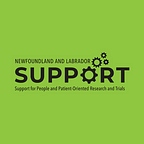Quality of Care NL Focuses on Environmental Sustainability in Health Care
Each Year on April 22, Earth Day is celebrated around the world and people are encouraged to take action to protect the environment. For the past year, Quality of Care NL (QCNL) has been exploring our health care system with an environmental sustainability lens.
QCNL works to improve social and health outcomes in Newfoundland and Labrador through research and evaluation. Our environment affects our health and well-being in many ways.
Did you know that the health care system in Canada contributes 4.6% of our total carbon emissions? This is more than the airline industry!¹ ²
There are many benefits to improving the carbon footprint of the health care system in our province — benefits that we can all appreciate and enjoy.
Working on Change
Because of the significant contribution of the health care system to carbon emissions, it fits with QCNL’s mandate to participate in work to reduce the climate impact of health care and thus, help improve the health of people in NL.
QCNL has connected with teams at NL Health Services to learn about efforts to reduce energy use in their facilities and the evaluation of the impact of patient meal selection on food waste in facilities in the Eastern zones. More details on those initiatives will be available in our upcoming edition of Practice Points, scheduled for release this spring.
Look for the leaf icon in upcoming Practice Points to see what projects have come from the environmental sustainability agenda.
QCNL is also involved in ongoing work related to Choosing Wisely Canada initiatives that support reductions in unnecessary tests and treatments. During its National Meeting on April 15, Choosing Wisely Canada awarded Quality of Care NL with the Organizational Leadership in Choosing Wisely Award, which acknowledges the team’s exceptional efforts in promoting and implementing Choosing Wisely principles.
In January 2024, the Health Sciences Centre in St. John’s was designated a Choosing Wisely Canada Hospital at the Quality Improvement Status level — the first hospital in Canada to receive this designation under Choosing Wisely Canada’s new program! QCNL worked with the dedicated teams at NL Health Services as they successfully implemented quality improvement initiatives, some of which also address the environmental impact (i.e. reducing unnecessary overuse of tests and treatments which, in turn, reduces patient travel (and thus, carbon emissions), biomedical waste, and saves medical supplies such as vials, tubing, etc.).
Desflurane Needs to Des-appear
A particular project could have a major impact on reducing the carbon footprint of NL’s health care industry. Desflurane is a harmful anesthetic gas that is estimated to be 2,500 times more potent as a greenhouse gas than carbon dioxide, and makes up to 80% of the greenhouse gases stemming from anesthetics in the atmosphere.³
Here in NL, we’ve made significant strides in reducing the use of desflurane, but this campaign aims to eliminate its use entirely, in favour of less harmful alternatives.
One hour of desflurane is equivalent to the CO2 produced from driving 320 km, while sevoflurane is comparable to driving 6.5 km.⁴ Desflurane persists in the atmosphere for 14 years, compared to only one year for sevoflurane.⁵
If you’d like to learn more about the environmental sustainability of health care and QCNL’s efforts in this area, please contact Krista Mahoney at kmahoney@mun.ca.
Some additional resources are listed below for individuals who are interested in this area:
- United Nations Actions for a Healthy Planet
- Choosing Wisely and the climate crisis: a role for clinicians
- Learning to treat the climate emergency together: social tipping interventions by the health community
References
¹ Life cycle environmental emissions and health damages from the Canadian healthcare system: An economic-environmental-epidemiological analysis. https://doi.org/10.1371/journal.pmed.1002623
² Canada’s Aviation Climate Action Plan 2022–2030. https://tc.canada.ca/en/corporate-services/policies/canada-s-aviation-climate-action-plan
³ How Canadian hospitals are decreasing carbon emissions. https://doi.org/10.1503/cmaj.1096048
⁴ A long way to go: minimizing the carbon footprint from anesthetic gases. https://doi.org/10.1007/s12630-019-01348-1
⁵ Global Warming Potential of Inhaled Anesthetics, Application to Clinical Use. https://journals.lww.com/anesthesia-analgesia/fulltext/2010/07000/global_warming_potential_of_inhaled_anesthetics_.21.aspx
Subscribe to our monthly newsletter at http://bit.ly/SupportLettersSubscribe.
